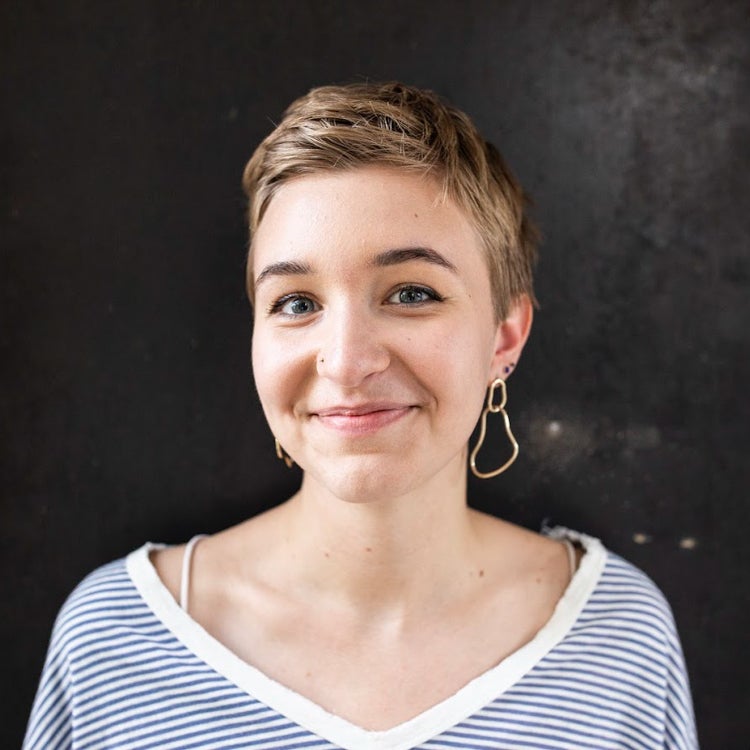
Carolyn Sizemore
Major: English
Thesis: Hidden in Plain Sight: Activism and Materiality in the Tallahassee Zine Community
Thesis Director: Dr. Michael Neal
Graduation: Spring 2021
QUESTIONS FOR CAROLYN:
Where are you from?
"I’m from Fort Myers, Florida."
How did you hear about the Honors in the Major [HITM] program at FSU? What made you want to apply to the program?
"I heard about the Honors in the Major program through other upperclassmen friends who had done it or considered it. I’ve always been interested in the idea of conducting my own research, and I thought it would be cool to contribute with a topic I believe deserves further study. I was also just starting to see where some of my own ideas and research interests were emerging, and I thought an honors thesis would be a great way to conduct a more sustained focus on exploring them."
How did you find and recruit your thesis director?
"Dr. Michael Neal led my Visual Rhetoric class just when I was beginning to seriously think about doing an honors thesis and what it might look like. I had just started to narrow down what sort of concepts I was interested in, and I noticed that a lot of what we were discussing and what Dr. Neal was pushing us to uncover in class just complimented a lot of those interests very organically. I was able to meet with him during office hours to discuss what I was thinking, and he was immediately very supportive of what I was trying to accomplish and also felt it would be a good fit."
In a few sentences, tell us about your honors thesis. What is it about, and why did you pick this topic?
"My honors thesis is about zines, or self-published, DIY booklets, and how their affordances allow them to function uniquely in activist spaces. As material artifacts that can be written on and edited, created communally, and assembled relatively cheaply and quickly, zines have a lot of unique abilities for working in art and activist communities. Building on theories of materiality as a means of community-building, meaning-making, and learning, I wanted to think through zines in this lens, using both a creative and a research component. Zines as a physical method of communication, and the communities of transfer built around them, have always fascinated me, and I really wanted to build out scholarship on understanding the way they function— especially because I felt there were many interesting connections to be made between what I’d experienced as a maker of zines and what the rhetoricians I was most interested in had been writing about."
What was the biggest challenge you encountered when working on the honors thesis, and how did you approach it?
"I reached the final part of my thesis right as the pandemic was beginning, and, like many students, it was difficult for me to stay focused and motivated, especially through the rigor of revising my thesis and preparing for my defense. I was lucky enough to have a committee that was equally passionate and excited about what I was doing, and their interest and enthusiasm for the project really helped to keep me going when I was losing steam."
Your supervisory committee has noted that you did an exemplary job on your honors thesis and in your final oral defense. Congratulations on this! What do you attribute your success to?
"I really loved my topic, and I also felt that it was important. Even though there were definitely times when I didn’t enjoy writing or revising my thesis, I still felt that this was a topic I wanted to be better represented in academia, and I felt hopeful that others could get something out of it, too. I think that passion really translated, and it allowed me to remain motivated in learning as much as possible about my thesis topic and really pursuing it to the fullest extent possible."
What do you believe you have you gained by completing an honors thesis?
"Completing my honors thesis was the most rewarding academic achievement of my undergraduate career, and by far the most challenging. I genuinely didn’t know if I would be able to write something on this topic, given how niche my interest was, and I was worried I wouldn’t be able to see it through in a way that allowed the hands-on spirit zines are made in to coexist with the conventions of an academic paper. It allowed me to gain a lot more confidence in my writing and problem-solving in general, and it made me feel more hopeful that the things I am interested in learning more about are meaningful to others, too. "
What’s next for you? And do you have any future plans for your honors thesis?
"For now, I plan on taking a gap year to work and learn more about what I want to do next. Although I don’t currently have formal plans to, I would love to continue work on my honors thesis topic— I believe this is a growing area of interest, and one that can reveal a lot of important ideas about materiality, activism, and exchange."
